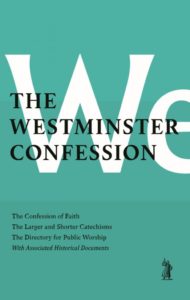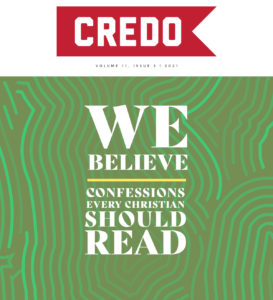Over the course of five politically tumultuous years, committees of the Assembly met and developed a set of documents that would have significant influence in defining the belief and practice of Presbyterian churches in Britain (especially in Scotland) and indeed the world. The doctrinal framework that the Assembly established in their Confession also provided the foundation of the central creedal documents of the Baptists and Congregationalists that were clarified in the decades following the Assembly.
Although the hoped-for unity between the English and Scottish churches did not materialize, nevertheless the documents produced by the Assembly, and especially the Confession of Faith and Larger and Shorter Catechisms, would become the touchstone for sound doctrine, cherished by generations of Christians as a well-honed summary of biblical truth.
O f the Confession of Faith itself, Professor John Murray noted: ‘The Westminster Confession is the last of the great reformation creeds. No creed of the Christian church is comparable to that of Westminster in respect of the skill with which the fruits of fifteen centuries of Christian thought have been preserved, and at the same time examined anew and clarified in the light of that fuller understanding of God’s word which the Holy Spirit has imparted.’
f the Confession of Faith itself, Professor John Murray noted: ‘The Westminster Confession is the last of the great reformation creeds. No creed of the Christian church is comparable to that of Westminster in respect of the skill with which the fruits of fifteen centuries of Christian thought have been preserved, and at the same time examined anew and clarified in the light of that fuller understanding of God’s word which the Holy Spirit has imparted.’
This volume contains the Confession of Faith, the Larger and Shorter Catechisms, and the other principal documents to come out of the Westminster Assembly. The text is newly typeset, and biblical references are given in full. Later American revisions of the Westminster Confession are included in an appendix.
Below you will find the first paragraph of each article of the Westminster Confession for your edification.
CHAPTER 1
Of the Holy Scripture
1. Although the light of nature, and the works of creation and providence do so far manifest the goodness, wisdom, and power of God, as to leave men unexcusable; yet are they not sufficient to give that knowledge of God, and of his will, which is necessary unto salvation. Therefore it pleased the Lord, at sundry times, and in divers manners, to reveal himself, and to declare that his will unto his church; and afterwards, for the better preserving and propagating of the truth, and for the more sure establishment and comfort of the church against the corruption of the flesh, and the malice of Satan and of the world, to commit the same wholly unto writing: which maketh the Holy Scripture to be most necessary; those former ways of God’s revealing his will unto his people being now ceased.
CHAPTER 2
Of God, and of the Holy Trinity
1. There is but one only, living, and true God, who is infinite in being and perfection, a most pure spirit, invisible, without body, parts, or passions; immutable, immense, eternal, incomprehensible, almighty, most wise, most holy, most free, most absolute; working all things according to the counsel of his own immutable and most righteous will, for his own glory; most loving, gracious, merciful, long-suffering, abundant in goodness and truth, forgiving iniquity, transgression, and sin; the rewarder of them that diligently seek him; and withal, most just, and terrible in his judgments, hating all sin, and who will by no means clear the guilty.
CHAPTER 3
Of God’s Eternal Decree
1. God, from all eternity, did, by the most wise and holy counsel of his own will, freely, and unchangeably ordain whatsoever comes to pass: yet so, as thereby neither is God the author of sin, nor is violence offered to the will of the creatures; nor is the liberty or contingency of second causes taken away, but rather established.
CHAPTER 4
Of Creation
1. It pleased God the Father, Son, and Holy Ghost, for the manifestation of the glory of his eternal power, wisdom, and goodness, in the beginning, to create, or make of nothing, the world, and all things therein whether visible or invisible, in the space of six days; and all very good.
CHAPTER 5
Of Providence
1. God the great Creator of all things doth uphold, direct, dispose, and govern all creatures, actions, and things, from the greatest even to the least, by his most wise and holy providence, according to his infallible foreknowledge, and the free and immutable counsel of his own will, to the praise of the glory of his wisdom, power, justice, goodness, and mercy.
CHAPTER 6
Of the Fall of Man, of Sin, and of the Punishment Thereof
1. Our first parents, being seduced by the subtlety and temptation of Satan, sinned, in eating the forbidden fruit. This their sin, God was pleased, according to his wise and holy counsel, to permit, having purposed to order it to his own glory.
CHAPTER 7
Of God’s Covenant with Man
1. The distance between God and the creature is so great, that although reasonable creatures do owe obedience unto him as their Creator, yet they could never have any fruition of him as their blessedness and reward, but by some voluntary condescension on God’s part, which he hath been pleased to express by way of covenant.
CHAPTER 8
Of Christ the Mediator
1. It pleased God, in his eternal purpose, to choose and ordain the Lord Jesus, his only begotten Son, to be the Mediator between God and man, the Prophet, Priest, and King, the Head and Savior of his church, the Heir of all things, and Judge of the world: unto whom he did from all eternity give a people, to be his seed, and to be by him in time redeemed, called, justified, sanctified, and glorified.
CHAPTER 9
Of Free Will
1. God hath endued the will of man with that natural liberty, that it is neither forced, nor, by any absolute necessity of nature, determined to good, or evil.
CHAPTER 10
Of Effectual Calling
1. All those whom God hath predestinated unto life, and those only, he is pleased, in his appointed and accepted time, effectually to call, by his Word and Spirit, out of that state of sin and death, in which they are by nature, to grace and salvation, by Jesus Christ; enlightening their minds spiritually and savingly to understand the things of God, taking away their heart of stone, and giving unto them a heart of flesh; renewing their wills, and, by his almighty power, determining them to that which is good, and effectually drawing them to Jesus Christ: yet so, as they come most freely, being made willing by his grace.
CHAPTER 11
Of Justification
1. Those whom God effectually calleth, he also freely justifieth: not by infusing righteousness into them, but by pardoning their sins, and by accounting and accepting their persons as righteous; not for anything wrought in them, or done by them, but for Christ’s sake alone; nor by imputing faith itself, the act of believing, or any other evangelical obedience to them, as their righteousness; but by imputing the obedience and satisfaction of Christ unto them, they receiving and resting on him and his righteousness, by faith; which faith they have not of themselves, it is the gift of God.
CHAPTER 12
Of Adoption
1. All those that are justified, God vouchsafeth, in and for his only Son Jesus Christ, to make partakers of the grace of adoption, by which they are taken into the number, and enjoy the liberties and privileges of the children of God, have his name put upon them, receive the Spirit of adoption, have access to the throne of grace with boldness, are enabled to cry, Abba, Father, are pitied, protected, provided for, and chastened by him, as by a father: yet never cast off, but sealed to the day of redemption; and inherit the promises, as heirs of everlasting salvation.
CHAPTER 13
Of Sanctification
1. They, who are once effectually called, and regenerated, having a new heart, and a new spirit created in them, are further sanctified, really and personally, through the virtue of Christ’s death and resurrection, by his Word and Spirit dwelling in them: the dominion of the whole body of sin is destroyed, and the several lusts thereof are more and more weakened and mortified; and they more and more quickened and strengthened in all saving graces, to the practice of true holiness, without which no man shall see the Lord.
CHAPTER 14
Of Saving Faith
1. The grace of faith, whereby the elect are enabled to believe to the saving of their souls, is the work of the Spirit of Christ in their hearts, and is ordinarily wrought by the ministry of the Word, by which also, and by the administration of the sacraments, and prayer, it is increased and strengthened.
CHAPTER 15
Of Repentance unto Life
1. Repentance unto life is an evangelical grace, the doctrine whereof is to be preached by every minister of the gospel, as well as that of faith in Christ.
CHAPTER 16
Of Good Works
1. Good works are only such as God hath commanded in his holy Word, and not such as, without the warrant thereof, are devised by men, out of blind zeal, or upon any pretense of good intention.
CHAPTER 17
Of the Perseverance of the Saints
1. They, whom God hath accepted in his Beloved, effectually called, and sanctified by his Spirit, can neither totally nor finally fall away from the state of grace, but shall certainly persevere therein to the end, and be eternally saved.
CHAPTER 18
Of the Assurance of Grace and Salvation
1. Although hypocrites and other unregenerate men may vainly deceive themselves with false hopes and carnal presumptions of being in the favor of God, and estate of salvation (which hope of theirs shall perish): yet such as truly believe in the Lord Jesus, and love him in sincerity, endeavoring to walk in all good conscience before him, may, in this life, be certainly assured that they are in the state of grace, and may rejoice in the hope of the glory of God, which hope shall never make them ashamed.
CHAPTER 19
Of the Law of God
1. God gave to Adam a law, as a covenant of works, by which he bound him and all his posterity to personal, entire, exact, and perpetual obedience, promised life upon the fulfilling, and threatened death upon the breach of it, and endued him with power and ability to keep it.
CHAPTER 20
Of Christian Liberty, and Liberty of Conscience
1. The liberty which Christ hath purchased for believers under the gospel consists in their freedom from the guilt of sin, the condemning wrath of God, the curse of the moral law; and, in their being delivered from this present evil world, bondage to Satan, and dominion of sin; from the evil of afflictions, the sting of death, the victory of the grave, and everlasting damnation; as also, in their free access to God, and their yielding obedience unto him, not out of slavish fear, but a childlike love and willing mind. All which were common also to believers under the law. But, under the new testament, the liberty of Christians is further enlarged, in their freedom from the yoke of the ceremonial law, to which the Jewish church was subjected; and in greater boldness of access to the throne of grace, and in fuller communications of the free Spirit of God, than believers under the law did ordinarily partake of.
CHAPTER 21
Of Religious Worship, and the Sabbath Day
1. The light of nature showeth that there is a God, who hath lordship and sovereignty over all, is good, and doth good unto all, and is therefore to be feared, loved, praised, called upon, trusted in, and served, with all the heart, and with all the soul, and with all the might. But the acceptable way of worshiping the true God is instituted by himself, and so limited by his own revealed will, that he may not be worshiped according to the imaginations and devices of men, or the suggestions of Satan, under any visible representation, or any other way not prescribed in the Holy Scripture.
CHAPTER 22
Of Lawful Oaths and Vows
1. A lawful oath is a part of religious worship, wherein, upon just occasion, the person swearing solemnly calleth God to witness what he asserteth, or promiseth, and to judge him according to the truth or falsehood of what he sweareth.
CHAPTER 23
Of the Civil Magistrate
1. God, the supreme Lord and King of all the world, hath ordained civil magistrates, to be, under him, over the people, for his own glory, and the public good: and, to this end, hath armed them with the power of the sword, for the defense and encouragement of them that are good, and for the punishment of evildoers.
CHAPTER 24
Of Marriage and Divorce
1. Marriage is to be between one man and one woman: neither is it lawful for any man to have more than one wife, nor for any woman to have more than one husband, at the same time.
CHAPTER 25
Of the Church
1. The catholic or universal church, which is invisible, consists of the whole number of the elect, that have been, are, or shall be gathered into one, under Christ the Head thereof; and is the spouse, the body, the fullness of him that filleth all in all.
CHAPTER 26
Of the Communion of Saints
1. All saints, that are united to Jesus Christ their Head, by his Spirit, and by faith, have fellowship with him in his graces, sufferings, death, resurrection, and glory: and, being united to one another in love, they have communion in each other’s gifts and graces, and are obliged to the performance of such duties, public and private, as do conduce to their mutual good, both in the inward and outward man.
CHAPTER 27
Of the Sacraments
1. Sacraments are holy signs and seals of the covenant of grace, immediately instituted by God, to represent Christ, and his benefits; and to confirm our interest in him: as also, to put a visible difference between those that belong unto the church, and the rest of the world; and solemnly to engage them to the service of God in Christ, according to his Word.
CHAPTER 28
Of Baptism
1. Baptism is a sacrament of the new testament, ordained by Jesus Christ, not only for the solemn admission of the party baptized into the visible church; but also, to be unto him a sign and seal of the covenant of grace, of his ingrafting into Christ, of regeneration, of remission of sins, and of his giving up unto God, through Jesus Christ, to walk in newness of life. Which sacrament is, by Christ’s own appointment, to be continued in his church until the end of the world.
CHAPTER 29
Of the Lord’s Supper
1. Our Lord Jesus, in the night wherein he was betrayed, instituted the sacrament of his body and blood, called the Lord’s Supper, to be observed in his church, unto the end of the world, for the perpetual remembrance of the sacrifice of himself in his death; the sealing all benefits thereof unto true believers, their spiritual nourishment and growth in him, their further engagement in and to all duties which they owe unto him; and, to be a bond and pledge of their communion with him, and with each other, as members of his mystical body.
CHAPTER 30
Of Church Censures
1. The Lord Jesus, as King and Head of his church, hath therein appointed a government, in the hand of church officers, distinct from the civil magistrate.
CHAPTER 31
Of Synods and Councils
1. For the better government, and further edification of the church, there ought to be such assemblies as are commonly called synods or councils: and it belongeth to the overseers and other rulers of the particular churches, by virtue of their office, and the power which Christ hath given them for edification and not for destruction, to appoint such assemblies; and to convene together in them, as often as they shall judge it expedient for the good of the church.
CHAPTER 32
Of the State of Men after Death, and of the Resurrection of the Dead
1. The bodies of men, after death, return to dust, and see corruption: but their souls, which neither die nor sleep, having an immortal subsistence, immediately return to God who gave them: the souls of the righteous, being then made perfect in holiness, are received into the highest heavens, where they behold the face of God, in light and glory, waiting for the full redemption of their bodies. And the souls of the wicked are cast into hell, where they remain in torments and utter darkness, reserved to the judgment of the great day. Besides these two places, for souls separated from their bodies, the Scripture acknowledgeth none.
CHAPTER 33
Of the Last Judgment
1. God hath appointed a day, wherein he will judge the world, in righteousness, by Jesus Christ, to whom all power and judgment is given of the Father. In which day, not only the apostate angels shall be judged, but likewise all persons that have lived upon earth shall appear before the tribunal of Christ, to give an account of their thoughts, words, and deeds; and to receive according to what they have done in the body, whether good or evil.


